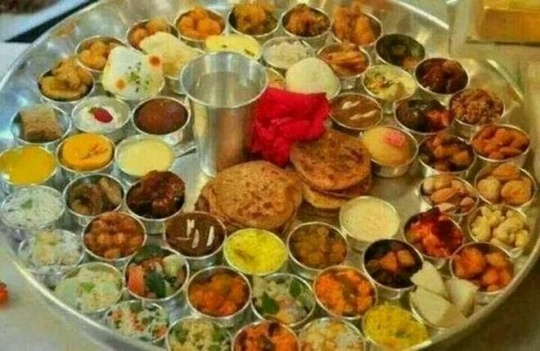As an Indian living abroad, I have noticed how confusing it is for people to understand the vast diversity within India. I empathize with them. With 29 states, 7 Union Territories, 20 officially recognized languages (each with multiple dialects) and at least 6 distinct religions, India would probably be the most complex chapter in the textbook of diversity!
Here is an easy way to understand the diversity in India:
“India is like a thali — a collection of sumptuous dishes in different bowls. Each may not mix with the next, but they combine on your palate to produce a satisfying repast.” – Shashi Tharoor
Now, for most people, even within India, it is impossible to name all the dishes in a thali. As a quick fix we resort to grouping them – the sweet stuff, the rice items, the spicy stuff, and the side dishes and so on.
An Indian thali. To further complicate things, each region in Indian has its own thali!
If India is the thali, its people are the different dishes. And because nobody understands the whole set, stereotypes have become a quick fix. “Oh you are from the South! A Madrasi!” or “She loves fish and wears a big bindi! She must be a Bengali!” The list of such stereotypes is long. While stereotypes originated as an easy way to classify people, today, they are a source of bias and prejudice. Inadvertently, people allow stereotypes to influence critical judgements. Changing this behaviour is key to creating an Inclusive culture across India and the first step to change is awareness.
PinMyState is a simple ice breaker game that gives players the opportunity to understand how stereotypes can be misleading. It was inspired by the numerous stories of my family and friends who were were victims (and sometimes assaulters) of stereotype driven prejudice. It is designed to be a physical game played in groups. Such a design encourages an open dialog among players which would possibly lead to realizations. The game play of PinMyState is tailored in a way that tempts players to use their existing knowledge about stereotypes to make quick (but not necessarily correct) judgments. Further an element of competition accompanied by time pressure acts as a catalyst to accelerate such behaviour. In each round of game play players discover clues about a person and must identify which state/union territory the person is from. The challenge is for players to discover the balance between quick decisions and informed decisions. Click here for a more complete description of the game rules.
The game was initially based exclusively on stereotypes. It was interesting to notice how resistant people were to the realization that they had misjudged based on a stereotype. During the play testing players felt that the game was unfair and “made-up”. As a resolution, the content was modified to revolve around celebrities. Thus, players not only discovered how stereotypes can be misleading, but were also convinced that the possibilities of such a misjudgment is realistic and impactful. Sample game content can be found here.
The open nature of the game content allows for modifications and customization based on the target audience. The game serves as a simple ice breaker for a workshop or session on diversity. Although, the game is not very sustainable on its own (players may recognize the pattern after the first game play), it can be enriched with more ambiguous clues.
The game has currently been designed to be played as a physical icebreaker during workshops. It may be worthwhile to analyse the possibility of a digital version- One idea is where the players have to sort through lost baggage and send them to the right town based on clues that are found on the baggage.

